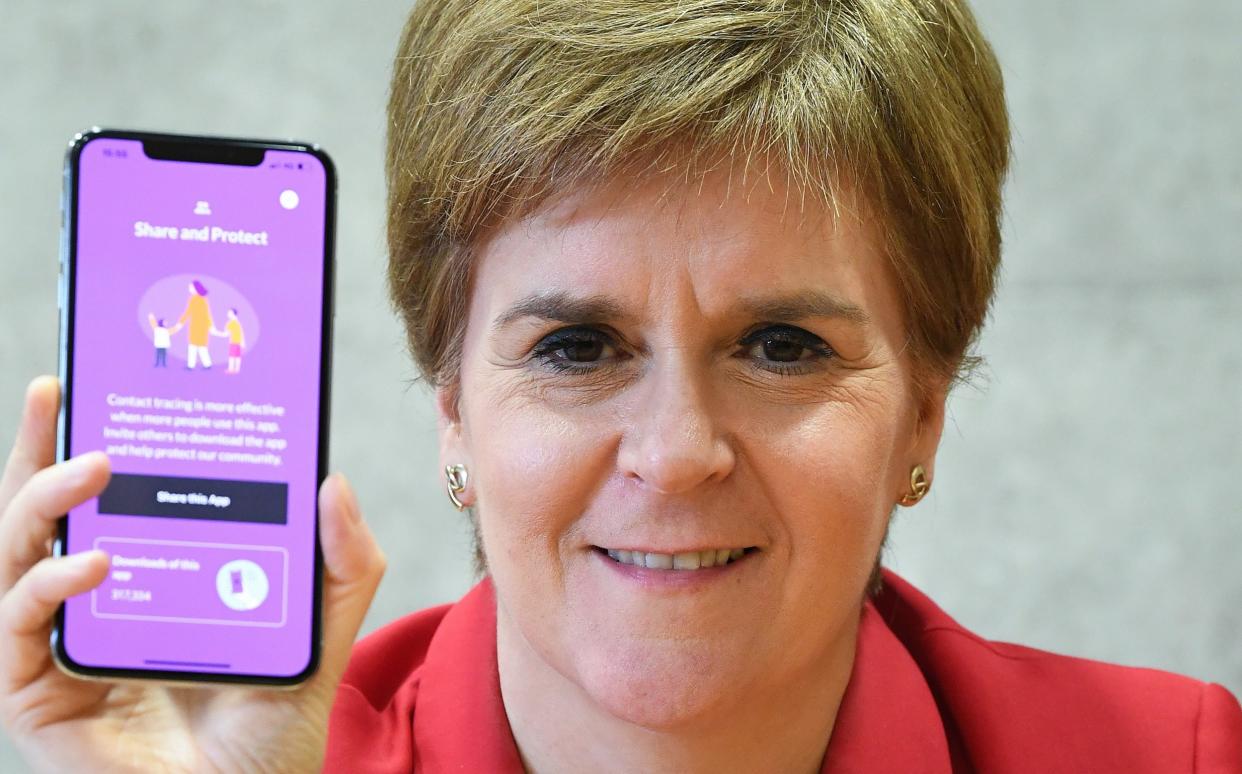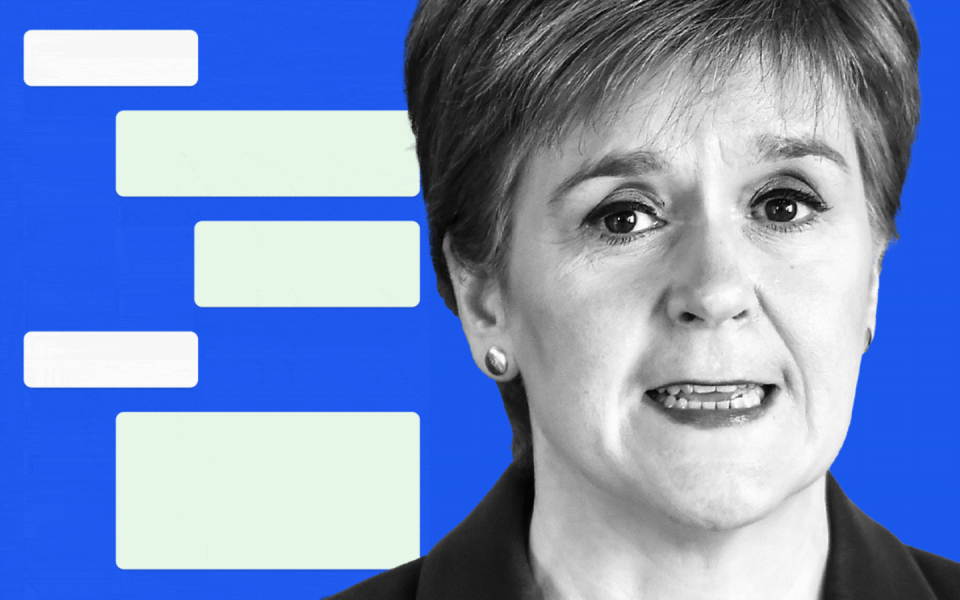Sturgeon deleted all Covid WhatsApps, inquiry told


Nicola Sturgeon and her deputy deleted all of their pandemic WhatsApp messages, the Covid Inquiry has heard.
At a hearing in Edinburgh on Friday, the inquiry was told that Ms Sturgeon, the former first minister, had “retained no messages whatsoever” over the pandemic, while John Swinney, her deputy, used an “auto-delete function”.
Ms Sturgeon’s deletion of her WhatsApps put her at odds with UK figures who appeared before the inquiry.
Boris Johnson and senior aides were grilled over WhatsApps which revealed a toxic culture in Downing Street, but Ms Sturgeon will escape such scrutiny as Inquiry lawyers are unable to trawl through her messages.
Ms Sturgeon has often sought to portray herself as more professional than her UK counterparts, calling Mr Johnson “a disgrace to the office” of prime minister and criticising partygate.
Ms Sturgeon had repeatedly refused to say whether she deleted her WhatsApp messages after the inquiry complained that key decision-makers had failed to hand over the information.
However, during evidence from Lesley Fraser, the director general corporate of the Scottish Government, Jamie Dawson KC, lead counsel for the inquiry’s module on Scotland, revealed that all of Ms Sturgeon’s messages had been deleted.
Making reference to a schedule of what messages could be handed to the inquiry, he said: “Under the box ‘Nicola Sturgeon’, it says that messages were not retained, they were deleted in routine tidying up of inboxes or changes of phones, unable to retrieve messages.
“What that tends to suggest is at the time that request was made Nicola Sturgeon, the former first minister of Scotland, had retained no messages whatsoever in connection with her management of the pandemic.”
Ms Fraser replied: “That’s what that indicates to me.”
Mr Dawson continued: “When we asked the Government whether it had retained any such messages on its corporate record, you provided us with none.”
Ms Fraser replied: “Correct.”
Asked if that meant the inquiry had no access to Ms Sturgeon’s messages in connection with her management of the pandemic, Ms Fraser said that the former first minister would have reported anything of importance to her private office.
She said: “Ms Sturgeon would have worked with her private office in order to ensure that her views and instructions were clearly understood and they may well have been informed by some of the exchanges that she’d had with her chief of staff or with other ministers but she would have relayed that to her private office and that would be then the instruction that went from private office and that would be retained.”
Asked if she “knew that to have happened”, she said: “That’s how government works, it’s a necessity.”
Pressed on how the Government could know discussions were added to the official record if neither the Government nor Ms Sturgeon had access to the messages, she said: “I can’t know, not having seen all of the information.”
The inquiry was shown a document about how WhatsApp was used during the pandemic and what messages were retained.
It showed that Ms Sturgeon had admitted using WhatsApp to exchange information and views with colleagues but claimed that “anything of significance requiring action” would be raised at formal meetings.
Ms Sturgeon used WhatsApp occasionally with Mr Swinney and also with Humza Yousaf, the current First Minister, as well as Liz Lloyd, her most senior advisor.
The document added: “Messages were not retained, they were deleted in routine tidying up of inboxes or changing of phones, all substantive issues were recorded by Private Office emails. Auto delete was not active. Unable to retrieve messages. Nothing to return.”
According to the same schedule, no documents were retained by Mr Swinney despite communicating with Ms Sturgeon, Jeanne Freeman, the then health secretary, and Mr Yousaf “for the purpose of raising urgent information and preparing for formal meetings”.
“Messages would have been deleted by auto-delete functions or by themselves manually deleting them as they do on a regular basis,” the document said.
Inquiry made repeated requests to Scottish Government
Ms Fraser, who was responsible for the management of records, said that Ms Sturgeon and Mr Yousaf had repeatedly pledged to the principles of “openness and transparency and to co-operating fully with both the UK and Scottish Covid-19 inquiries”.
Ms Fraser also agreed with Mr Dawson KC, lead counsel for the inquiry’s module on Scotland, that this represented a “bond of honesty with the people of Scotland”.
He said the inquiry had been forced to make repeated requests to the Scottish Government for its record management policies, with some information only being provided in the “last couple of days”.
Ms Fraser said the “fundamental document” was its records management policy and a “supplement” was produced in November 2021 that explained in more detail how to treat mobile phone messages.
But Mr Dawson argued that the difficulty the Scottish Government had had in locating the policies “tend to suggest that retention doesn’t work very well”.
Ms Fraser said: “Ministers would have been able to see the mobile messaging policy – it’s not a secret policy.
“It’s written from the perspective of civil servants because civil servants are the ones with the responsibility but the good practice guidance would equally apply to ministers.”
She said ministers would have also “been aware of the necessity of talking to their private office” about what was required of them to comply with the November supplement.
But the records management policy states that information should be retained only as long as they are required to support the Scottish Government in its business requirements and legal obligations. This gives ministers the latitude to decide what should be kept and what deleted.
Inquiry chairman frustrated
A frustrated Baroness Hallett, the inquiry chairman, interrupted Ms Fraser to state she was “not following” and to ask what should happen to WhatsApp messages between two ministers “in clear terms”.
She questioned whether ministers should act in accordance with the policy “that seems to be delete them when they are not needed” or to “tell the civil servants or private office about them”.
Ms Fraser said they would inform their private offices to take actions “as a result of the conversation we had”.
But Lady Hallett retorted that that process “may not record the rationale” for the decision and challenged Ms Fraser that she had agreed that “is one of the things that ought to be recorded”.
“So, in other words things could get lost if the ministers delete their WhatsApp messages without telling their private office everything that was discussed,” Lady Hallett said.
She said she did not “find the rules or principles clear” and questioned whether they conflicted with the requirement to keep such messages for Freedom of Information requests.
Ms Sturgeon had repeatedly refused to reveal whether she deleted messages and the inquiry has only been able to obtain a small number of her messages through colleagues’ phones or records.
According to a submission by the Scottish Trades Union Congress, a WhatsApp exchange between Ms Sturgeon and her chief advisor, Ms Lloyd, which showed the former first minister criticising the UK Government over changes to the furlough scheme.
“They really are a shower,” Ms Sturgeon wrote on Oct 31 2020.
“[Person A] has a catering company laid off all their workers yesterday and put company into liquidation because of furlough reduction. He says today’s announcement might have changed that, but too late.”
Ms Lloyd added: “Yep one of my pals lost her job yesterday and another was making half her colleagues redundant. Not a clue.”
A spokesman for Ms Sturgeon said: “In the interests of everyone who has been impacted by the Covid pandemic, Nicola is committed to full transparency to both the UK and Scottish Covid inquiries.
“Any messages she had, she handled and dealt with in line with the Scottish Government’s policies. Nicola has provided a number of written statements to the UK inquiry - totalling hundreds of pages - and welcomes the opportunity to give oral evidence to the inquiry again this month when she will answer all questions put to her.”
The SNP has been contacted for comment.

 Yahoo News
Yahoo News 
